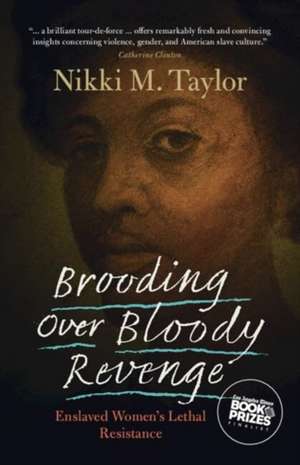Brooding over Bloody Revenge
Autor Nikki M. Tayloren Limba Engleză Paperback – 9 ian 2025
| Toate formatele și edițiile | Preț | Express |
|---|---|---|
| Paperback (1) | 102.72 lei 3-5 săpt. | |
| Cambridge University Press – 9 ian 2025 | 102.72 lei 3-5 săpt. | |
| Hardback (1) | 120.84 lei 3-5 săpt. | +17.75 lei 6-10 zile |
| Cambridge University Press – 12 iul 2023 | 120.84 lei 3-5 săpt. | +17.75 lei 6-10 zile |
Preț: 102.72 lei
Nou
Puncte Express: 154
Preț estimativ în valută:
19.67€ • 20.17$ • 16.56£
19.67€ • 20.17$ • 16.56£
Carte disponibilă
Livrare economică 05-19 februarie
Preluare comenzi: 021 569.72.76
Specificații
ISBN-13: 9781009276856
ISBN-10: 1009276859
Pagini: 256
Greutate: 0.3 kg
Editura: Cambridge University Press
ISBN-10: 1009276859
Pagini: 256
Greutate: 0.3 kg
Editura: Cambridge University Press
Cuprins
Introduction; 1. Phillis and Phoebe; 2. Annis, Phillis, and Lucy; 3. Cloe; 4. Rose Butler; 5. Jane Williams; 6. Nelly, Betsy, and Ellen; 7. Lucy; Conclusion.
Recenzii
'Nikki Taylor presents a compelling narrative not only of Black women's deadly force, but also of their organized and collective resistance. This study complicates the agency of women such as Nelly, Betsy, and Ellen, and dispels the idea that enslaved women were passive and powerless.' Karen Cook Bell, author of Running from Bondage: Enslaved Women and Their Remarkable Fight for Freedom in Revolutionary America
'Brooding Over Bloody Revenge is a brilliant tour-de-force. This powerful set of case studies create a prism for illuminating African American women's intellectual arc, their lived experience as enslaved bodies, and their powerful response to slavery's lash and legacy. Nikki Taylor's voice offers remarkably fresh and convincing insights concerning violence, gender, and American slave culture.' Catherine Clinton, author of Harriet Tubman: The Road to Freedom
This book is a powerful, gripping, and violent telling of enslaved women's resistance. It is hard, but necessary scholarship. The past five years have led to an explosion of cutting-edge research that centers black women in nuanced ways. I count Nikki Taylor's new book as part of this welcome wave.' Kellie Carter Jackson, author of Force and Freedom: Black Abolitionists and the Politics of Violence
'Nikki Taylor's framing of murderous actions as part of a larger practice of black feminist justice helps us understand these actions were not just about freedom and resistance. Taylor shows that enslaved women made many attempts to ameliorate their conditions, including coordinating with others, in search of justice.' Kelly A. Ryan, author of Everyday Crimes: Social Violence and Civil Rights in Early America
'… a cogent reconsideration of long-held assumptions about the gendered experience of American slavery.' Publishers Weekly
'Brooding Over Bloody Revenge is a brilliant tour-de-force. This powerful set of case studies create a prism for illuminating African American women's intellectual arc, their lived experience as enslaved bodies, and their powerful response to slavery's lash and legacy. Nikki Taylor's voice offers remarkably fresh and convincing insights concerning violence, gender, and American slave culture.' Catherine Clinton, author of Harriet Tubman: The Road to Freedom
This book is a powerful, gripping, and violent telling of enslaved women's resistance. It is hard, but necessary scholarship. The past five years have led to an explosion of cutting-edge research that centers black women in nuanced ways. I count Nikki Taylor's new book as part of this welcome wave.' Kellie Carter Jackson, author of Force and Freedom: Black Abolitionists and the Politics of Violence
'Nikki Taylor's framing of murderous actions as part of a larger practice of black feminist justice helps us understand these actions were not just about freedom and resistance. Taylor shows that enslaved women made many attempts to ameliorate their conditions, including coordinating with others, in search of justice.' Kelly A. Ryan, author of Everyday Crimes: Social Violence and Civil Rights in Early America
'… a cogent reconsideration of long-held assumptions about the gendered experience of American slavery.' Publishers Weekly
